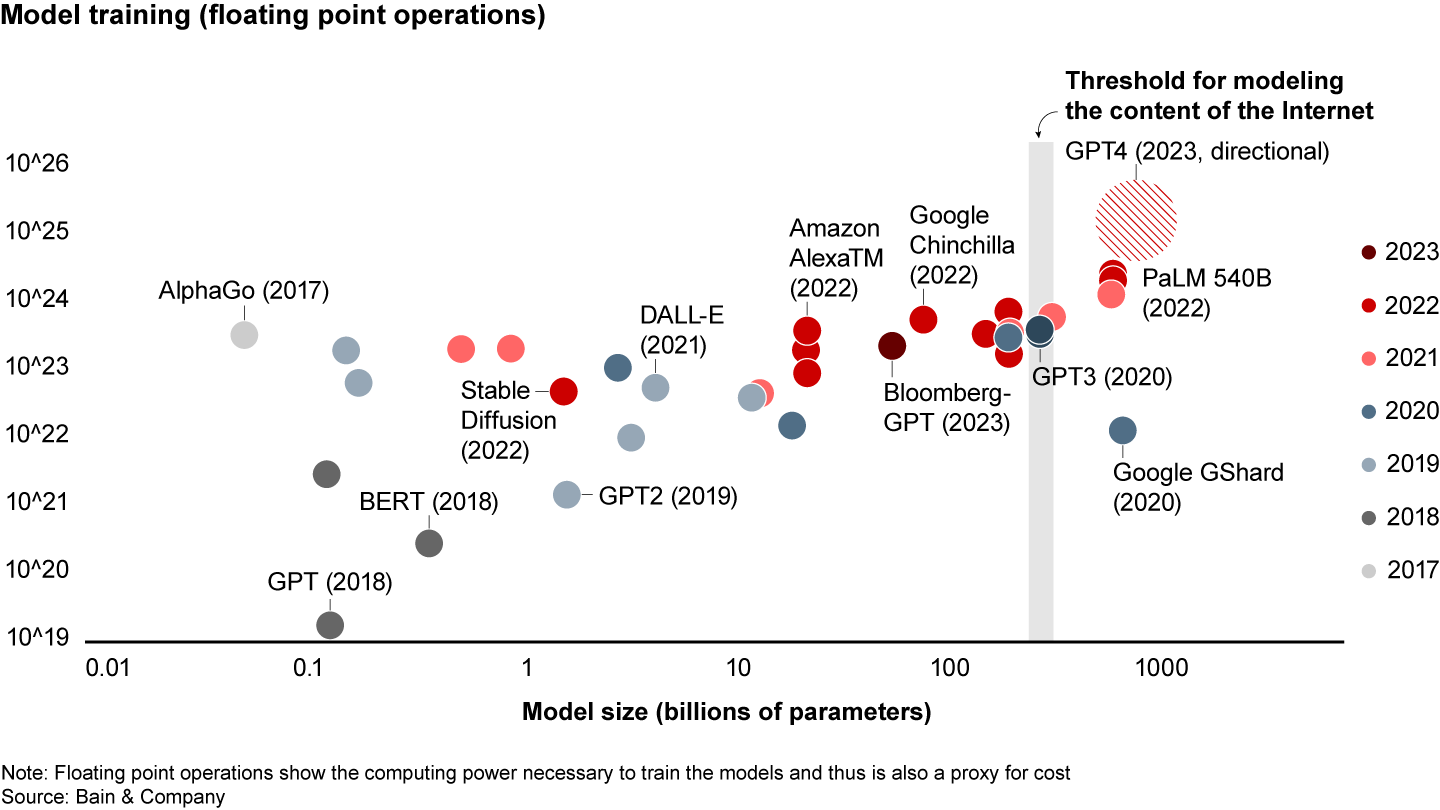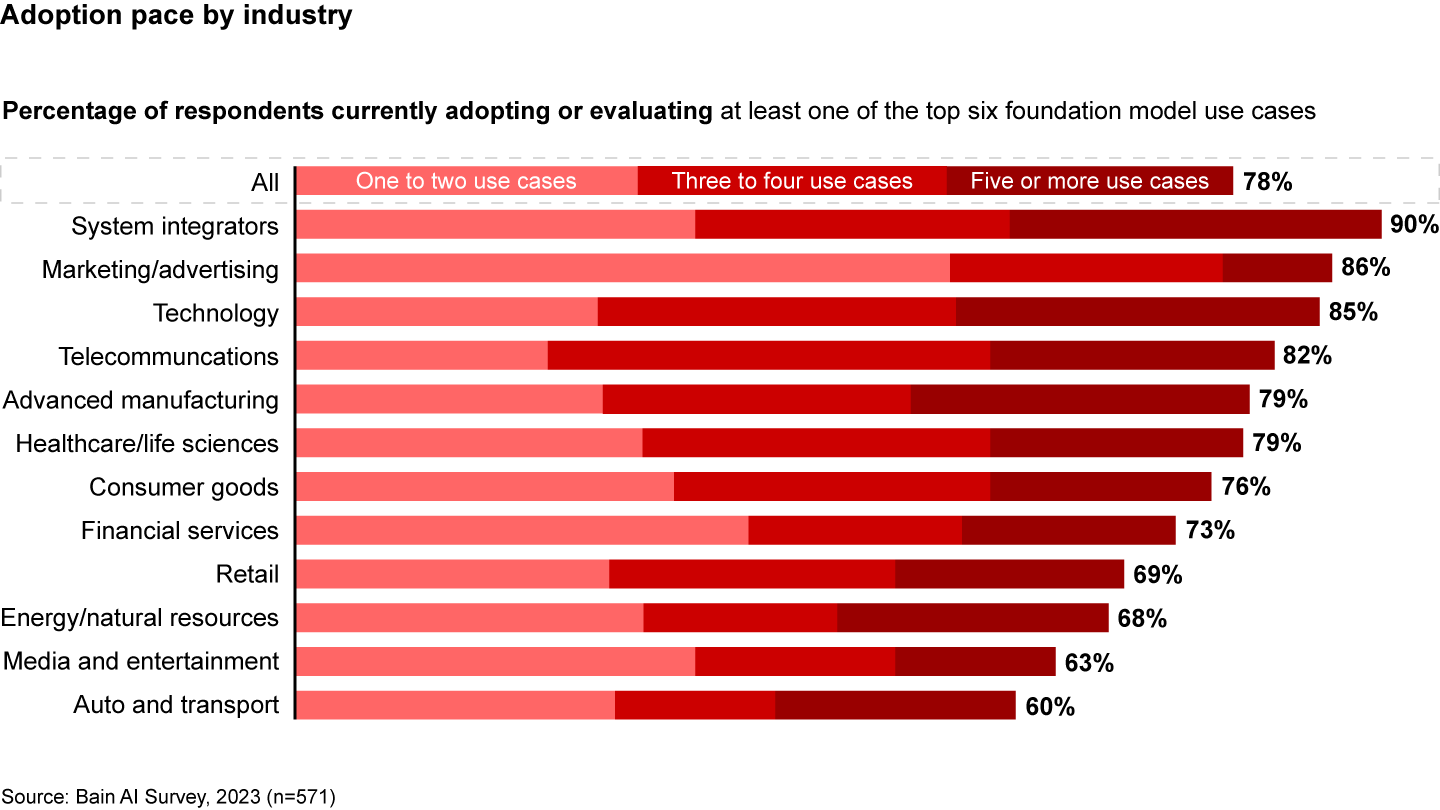Technology Report

Executive Summary
- It’s expensive to build the large foundation models that power generative AI, but once they exist, it’s relatively inexpensive to experiment with these models.
- The current generation of AI tools and models could help companies speed up 20% of worker tasks without a loss in quality.
- Engineering teams are already deploying AI coding assistants, and 75% of executives told us that AI has already met or exceeded their expectations.
- Beyond taking current work and making it better, faster, and cheaper, the real value of AI is likely to come from new uses that weren't possible before.
This article is part of Bain's 2023 Technology Report.
Few technology revolutions have rolled out this quickly.
Five years ago, machine intelligence lagged far behind humans. But over the past year, general purpose foundation models have demonstrated capabilities rivaling a person’s ability to perceive, understand, communicate, create, reason, and employ tools. The public release of ChatGPT late in 2022 made these models accessible to a large base that had no previous experience with artificial intelligence (AI). Two months after its public release, ChatGPT had gained more than 100 million users, an adoption rate five times faster than that of previous champ TikTok.
Of course, AI is an overnight success story decades in the making. We are still in the early days of one of the most important technology inflection points in history, but in this fast-moving environment, adopting a wait-and-see posture is as good as being left behind.
Most significantly for the enterprise, foundation models and AI represent much more than a technology revolution; there’s also an economic revolution underway. While the cost of building the foundation models is high and has increased as the models have grown larger (see Figure 1), their existence creates a relatively low bar for entry for companies to experiment with ways to use foundation models and generative AI in their business.


Until recently, AI work (and talent) has been concentrated among the big cloud service providers. Now, with the dramatic reduction in the economics of AI experimentation and application, it’s spilling over into a broader spectrum of industries and capabilities, where innovation is happening quickly and already creating new value.
How are tech leaders assessing their opportunities in foundation models and generative AI? Bain’s recent research reveals how technology executives are approaching this opportunity, where they’re investing and experimenting, and what the most likely disruptive plays could be in the months ahead.
Assessing potential
The most recent foundation models improved dramatically over previous generations, demonstrating better language abilities and scoring higher on tests. This dramatic change in economics and performance to understand, reason, generate, and act on unstructured data is revolutionizing knowledge work in the enterprise. Bain research suggests that access to a large language model and AI tools could help companies speed up 20% of worker tasks without a loss in quality. Companies are already deploying foundation models and generative AI tools to reduce costs, increase productivity, and enhance quality—cheaper, faster, and better. (For more, see the Bain infographic “The Era of Enterprise AI Is Here.”)
Enterprises are seeing early results and productivity gains in applications, including sales and marketing, IT ticket resolution, HR talent acquisition and performance management, software development, and customer contact centers and help desks. For example, in Bain’s recent research with software companies in the process of evaluating and rolling out generative AI–based coding assistants, 75% of executives said that AI met or exceeded their goals, 76% said it was speeding time to market, and 63% said it improved the quality of code. (For more, see the Bain infographic “AI Coding Assistants Are Already Living Up to Expectations.”) System integrators and IT services lead the pack in most disrupted industries and fastest adopters for activities such as writing code, supporting field services, and managing IT (see Figure 2).


Beyond “cheaper, faster, and better,” foundation models and generative AI are already creating new value in cases that weren’t possible before.
- Rapid upskilling: At one company, new customer service agents were able to reach productivity levels that normally take six months to attain in only two months because they were supported by generative AI models that suggested responses for them based on summaries of a vast database of answers.
- Hyper-personalization and A/B testing at marginal cost: For example, Khan Academy’s AI-powered guide Khanmigo helps students understand complex concepts by adapting to explain these concepts at various levels, depending on the students’ degree of understanding.
- Redefining the customer experience: Generative AI could fundamentally change how customers interact with software and data. For example, New Relic launched Grok, a feature aimed at allowing users responsible for monitoring applications and infrastructure to interrogate deep system telemetry data through natural language, aiming to dramatically simplify a typically sophisticated, complex user experience.
- Reimagining the business definition: Generative AI capabilities can expand the value of transactional apps by accessing more data about the user and relevant external data. For example, Carrefour introduced a shopping assistant called Hopla that does more than simply generate shopping lists and integrate with its website; it suggests new items and menu ideas based on budgets and diets.
- Core product innovation: Companies are using generative AI to radically reduce product development times and add new features to products. For example, pharmaceutical companies are using generative AI to speed up development times. Insilico Medicine, for example, deployed the technology to help identify a molecule that a drug compound could target and bond with, helping it predict the outcome of clinical trials. The company said using generative AI allowed it to accomplish these tasks in one-third the time and for one-tenth the cost. In game development, Roblox recently announced the development of a platform to enable users to create sophisticated 3D content via voice, text, or touch prompts by using generative AI, dramatically simplifying and democratizing the creator experience.
Building momentum
For senior executives and boards of tech companies, the arrival of AI at scale presents enormous opportunities. Most are closely focused on understanding how AI can add value, but it’s also important to tend to a range of technical and process issues that can support rapid deployment of AI solutions.
Among the technical aspects to consider:
- Are privacy and security mechanisms in place to ensure security for data and customers, as well as compliance with regulations?
- Do we have a solid build vs. buy strategy to ensure that we build only where it differentiates us while maintaining the right balance of vendor choices to avoid lock-in?
- Do we have the right machine learning operations (ML Ops) and engineering processes to test and maintain the quality and resilience of complex, non-deterministic models, as well as the quality of input data? And do we have a scalable architecture for reusable components and models?
- Do we have access to enough computing resources, including a wide spectrum of power and performance design points from the cloud to the edge?
Process questions include:
- Will our rapid experimentation in sandbox environments deliver quick wins that demonstrate potential value?
- Do we have a roadmap for scaling and change management that will help us capture the full potential value beyond the first experiments?
- Are we prepared to redesign business processes and redeploy labor as material innovations require?
The rapid uptake of AI over the past year and the many ways that it contributes to productivity and creativity have generated a broad wave of enthusiasm across the entire tech sector and beyond. Products and services seem likely to evolve quickly over the next six months, particularly since the establishment of large foundation models means that the cost for experimentation is relatively low. Waiting to see what competitors will do is tantamount to yielding the field. How will your company create new value with AI today?